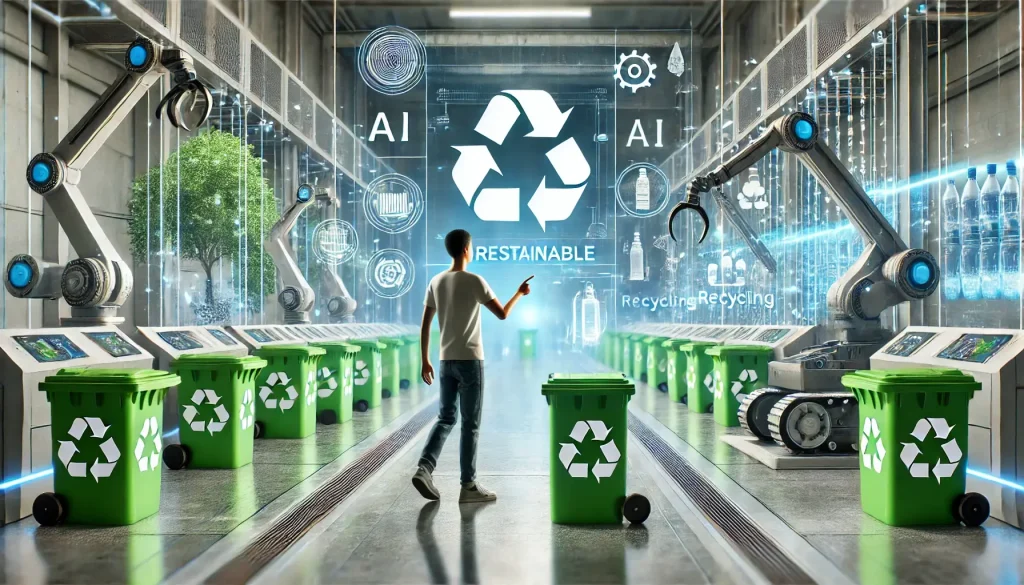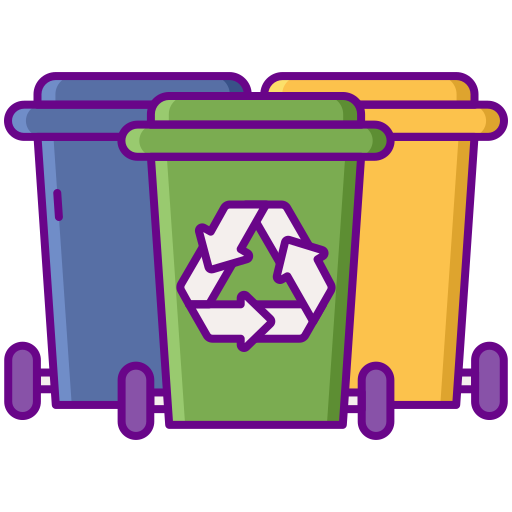In der heutigen, sich schnell entwickelnden Welt, in der ökologische Herausforderungen kreative Lösungen erfordern, ist die Fähigkeit zur erneuern im Recycling ist heute wichtiger denn je. Modernste nachhaltige Technologien verändern die Abfallwirtschaft, verwandeln weggeworfene Materialien in wertvolle Ressourcen und treiben uns in Richtung einer Kreislaufwirtschaft. Bei Eu Setor setzen wir uns für die Erforschung und Umsetzung innovativer Recyclinglösungen ein, die nicht nur unseren Planeten schützen, sondern auch neue Branchenstandards für Nachhaltigkeit setzen.

Index
Die Notwendigkeit von Innovationen im Recycling
Traditionelle Praktiken der Abfallwirtschaft reichen nicht mehr aus, um die wachsenden Herausforderungen der Umweltzerstörung und Ressourcenknappheit zu bewältigen. Indem wir uns den Geist zu eigen machen erneuernkönnen wir Recyclingprozesse umgestalten, um die Effizienz zu maximieren, den Energieverbrauch zu senken und die Abfallmenge zu minimieren. Innovative Recyclingtechnologien ermöglichen es uns,:
- Umwandlung komplexer Abfallströme in hochwertige Rohstoffe.
- Niedrigere Produktionskosten durch geringere Abhängigkeit von neuen Rohstoffen.
- Verringerung der Treibhausgasemissionen durch energieeffiziente Prozesse.
- Unterstützung der Entwicklung einer Kreislaufwirtschaft, die Ressourcen kontinuierlich wiederverwendet.
Dieses Engagement für erneuern erhöht nicht nur die Recyclingeffizienz, sondern trägt auch zu einer nachhaltigeren Zukunft bei.
Nachhaltige Schlüsseltechnologien für das Recycling
Fortschritte in der Technologie sind das Herzstück moderner Recyclinginitiativen. Hier sind einige der bahnbrechenden Technologien, die es uns ermöglichen erneuern im Recycling:
1. IoT und intelligente Sensoren
Die Integration von Internet-of-Things-Geräten (IoT) in die Recycling-Infrastruktur revolutioniert die Abfallwirtschaft. Intelligente Sensoren, die in Recyclingbehältern und Verarbeitungsanlagen installiert sind, sammeln Echtzeitdaten zu Abfallmengen, Verschmutzungsgrad und Materialzusammensetzung. Dieser datengesteuerte Ansatz hilft dabei,:
- Optimieren Sie die Sammelrouten: Die Echtzeitüberwachung ermöglicht es den Abfallmanagementsystemen, die Sammelrouten dynamisch anzupassen und so den Kraftstoffverbrauch und die Betriebskosten zu senken.
- Verbessern Sie die Sortiereffizienz: Intelligente Sensoren können die Zusammensetzung des Abfalls erkennen und ermöglichen es automatischen Sortiersystemen, Wertstoffe genauer von nicht verwertbaren Materialien zu trennen.
- Verbessern Sie die Prozessüberwachung: Die kontinuierliche Datenerfassung hilft bei der Ermittlung von Engpässen und Ineffizienzen und ermöglicht es den Einrichtungen, die Prozesse zu optimieren und den Gesamtdurchsatz zu erhöhen.
Durch die Nutzung der IoT-Technologie können Recyclingzentren erneuern ihre Tätigkeiten, was zu höheren Verwertungsquoten und einem geringeren ökologischen Fußabdruck führt.
2. Künstliche Intelligenz und maschinelles Lernen
Künstliche Intelligenz (KI) und Algorithmen des maschinellen Lernens verändern die Recyclingprozesse, indem sie die Sortier- und Verarbeitungstechniken optimieren. Diese Technologien können große Datenmengen analysieren, um die Genauigkeit und Geschwindigkeit der Materialtrennung zu verbessern.
- Automatisiertes Sortieren: KI-gestützte Systeme erkennen und sortieren verschiedene Arten von Wertstoffen mit bemerkenswerter Präzision, verringern die Verunreinigung und erhöhen die Qualität der recycelten Materialien.
- Vorausschauende Wartung: Modelle des maschinellen Lernens sagen voraus, wann ein Geräteausfall wahrscheinlich ist, und ermöglichen eine proaktive Wartung, die Ausfallzeiten minimiert und die Lebensdauer von Recyclingmaschinen verlängert.
- Prozess-Optimierung: Durch die Analyse von Betriebsdaten kann KI Verbesserungen der Arbeitsabläufe und des Energieverbrauchs vorschlagen und sicherstellen, dass Recyclinganlagen mit maximaler Effizienz arbeiten.
Diese Fortschritte ermöglichen es uns erneuern indem die Recyclingprozesse intelligenter werden und auf veränderte Bedingungen reagieren.
3. Chemisches Recycling
Das chemische Recycling stellt einen Durchbruch bei der Verarbeitung komplexer Abfallstoffe dar, insbesondere bei Kunststoffen, die sich nur schwer mechanisch recyceln lassen. Diese innovative Technologie zerlegt Polymere in ihre Grundbausteine, die dann zu neuen, hochwertigen Produkten repolymerisiert werden können.
- Verbesserte Materialrückgewinnung: Beim chemischen Recycling können verunreinigte oder mit anderen Materialien vermischte Kunststoffe in reine, wiederverwendbare Monomere umgewandelt werden.
- Energie-Effizienz: Durch die Rückgewinnung von Materialien auf molekularer Ebene verringert das chemische Recycling den Energiebedarf für die Herstellung neuer Kunststoffe aus fossilen Brennstoffen.
- Auswirkungen auf die Umwelt: Diese Technologie senkt die Treibhausgasemissionen erheblich und verringert die Menge an Kunststoffabfällen in Deponien und Ozeanen.
Das chemische Recycling ist ein gutes Beispiel dafür, wie wir erneuern um problematische Abfallströme in wertvolle Ressourcen zu verwandeln.
4. Mechanisches Recycling und fortschrittliches Sortieren
Während das chemische Recycling Fortschritte macht, bleibt das mechanische Recycling ein Eckpfeiler der nachhaltigen Abfallwirtschaft. Zu den Innovationen in diesem Bereich gehören:
- Robotersortiersysteme: Automatisierte Maschinen, die mit fortschrittlichen Sensoren und künstlicher Intelligenz ausgestattet sind, können Materialien mit noch nie dagewesener Geschwindigkeit und Genauigkeit trennen.
- Verbesserte Verarbeitungsausrüstung: Moderne Zerkleinerungsmaschinen, Schneidmühlen und Ballenpressen sind für die Verarbeitung einer Vielzahl von Materialien ausgelegt, wodurch der Energieverbrauch gesenkt und die Qualität des Outputs verbessert wird.
- Integrierte Systeme: Durch die Kombination von mechanischem Recycling mit digitalen Rückverfolgungssystemen können die Anlagen sicherstellen, dass die Materialien effizient wiederaufbereitet und in die Produktionskette zurückgeführt werden.
Diese Verbesserungen helfen erneuern herkömmliche mechanische Recyclingverfahren, so dass ein größerer Anteil der Abfälle tatsächlich wiederverwertet wird.
5. Blockchain und digitale Transparenz
Die Blockchain-Technologie entwickelt sich zu einem wichtigen Instrument zur Verbesserung der Transparenz und Effizienz von Recyclingverfahren. Durch die Erstellung einer unveränderlichen Aufzeichnung jedes Schritts im Recyclingprozess hilft die Blockchain dabei:
- Gewährleistung der Rechenschaftspflicht: Eine transparente Rückverfolgung der recycelten Materialien schafft Vertrauen bei Verbrauchern und Interessengruppen und stellt sicher, dass die Unternehmen umweltfreundliche Praktiken einhalten.
- Rationalisierung der Lieferketten: Ein überprüfbares digitales Hauptbuch vereinfacht die Verfolgung der Materialien von der Sammlung bis zur Wiederaufbereitung und erleichtert die Integration von recycelten Materialien in neue Produkte.
- Förderung von nachhaltigen Praktiken: Klare Daten über die Recyclingeffizienz und die Umweltauswirkungen bieten den Unternehmen einen Anreiz, in umweltfreundlichere Technologien und kontinuierliche Verbesserungen zu investieren.
Die Einführung der Blockchain-Technologie ist ein klares Beispiel dafür, wie wir erneuern um eine größere Verantwortlichkeit und Effizienz beim Recycling zu erreichen.
Wirtschaftliche und ökologische Auswirkungen
Die Einführung nachhaltiger Technologien im Recycling hat weitreichende wirtschaftliche und ökologische Vorteile. Diese Auswirkungen unterstreichen die Bedeutung kontinuierlicher Innovationen im Recyclingsektor.
Vorteile für die Umwelt
- Schonung der Ressourcen: Recycelte Materialien benötigen bei ihrer Herstellung weniger Energie als neue Materialien, was den Gesamtbedarf an natürlichen Ressourcen verringert.
- Geringere Emissionen: Energieeffiziente Recyclingverfahren senken die Treibhausgasemissionen und tragen so zu einer saubereren und gesünderen Umwelt bei.
- Abfallvermeidung: Durch fortschrittliche Recyclingtechnologien wird die Abfallmenge, die auf Deponien landet, minimiert, wodurch Ökosysteme geschützt und die Umweltverschmutzung verringert wird.
Wirtschaftlicher Nutzen
- Kosteneinsparungen: Indem sie die Abhängigkeit von neuen Rohstoffen verringern, können die Unternehmen ihre Produktionskosten senken und ihre Rentabilität steigern.
- Schaffung von Arbeitsplätzen: Die Recyclingindustrie, die sich auf innovative Technologien stützt, schafft Beschäftigungsmöglichkeiten in verschiedenen Bereichen, von der Sammlung und Sortierung bis hin zur Verarbeitung und Wiederaufbereitung.
- Wettbewerbsfähigkeit auf dem Markt: Unternehmen, die nachhaltige Recyclingpraktiken anwenden, haben oft einen Wettbewerbsvorteil, da sie umweltbewusste Verbraucher und Investoren ansprechen.
Soziale Auswirkungen
- Engagement für die Gemeinschaft: Verbesserte Recyclinginitiativen fördern die Beteiligung der Gemeinschaft und schärfen das öffentliche Bewusstsein für Nachhaltigkeit.
- Verbesserte öffentliche Gesundheit: Die Reduzierung von Abfall und Verschmutzung führt zu sauberer Luft und sauberem Wasser, was der öffentlichen Gesundheit und der Lebensqualität zugute kommt.
- Bildungsmöglichkeiten: Die Integration digitaler Technologien in das Recycling bietet Bildungsplattformen, die den Einzelnen dazu befähigen, umweltfreundliche Praktiken anzuwenden.
Zukünftige Wege: Innovationen für ein grüneres Morgen
Die Zukunft des Recyclings ist vielversprechend, angetrieben durch kontinuierliche Innovation und ein Engagement für Nachhaltigkeit. Aufkommende Trends und Technologien versprechen eine weitere Verbesserung der Ressourcenschonung und der wirtschaftlichen Effizienz.
Fortschritte bei KI und IoT
- Sensoren der nächsten Generation: Verbesserte IoT-Geräte werden noch genauere Echtzeitdaten liefern, die eine weitere Optimierung des Recyclingbetriebs ermöglichen.
- Verbesserte KI-Algorithmen: Da die Modelle des maschinellen Lernens immer ausgefeilter werden, werden sie die Sortierprozesse und die vorausschauende Wartung weiter verfeinern und die Recyclinganlagen intelligenter und effizienter machen.
Durchbrüche im Chemikalienrecycling
- Breitere Materialverarbeitung: Künftige chemische Recyclingverfahren werden die Palette der verarbeitbaren Materialien erweitern, einschließlich mehrschichtiger Kunststoffe und Verbundwerkstoffe.
- Energieoptimierte Prozesse: Innovationen im Bereich des chemischen Recyclings werden sich darauf konzentrieren, den Energieverbrauch noch weiter zu senken und das Verfahren wirtschaftlich und ökologisch rentabel zu machen.
Globale Zusammenarbeit und politische Integration
- Internationale Normen: Die Entwicklung globaler Recyclingstandards wird die Kohärenz und Nachhaltigkeit über die Grenzen hinweg sicherstellen.
- Öffentlich-private Partnerschaften: Eine verstärkte Zusammenarbeit zwischen Regierungen, Unternehmen und Gemeinden wird Investitionen in innovative Recyclingtechnologien fördern.
- Befähigung der Verbraucher: Die zunehmende Sensibilisierung der Öffentlichkeit und die Nachfrage nach nachhaltigen Produkten werden die Unternehmen dazu veranlassen, umweltfreundlichere Praktiken einzuführen und die Recyclingeffizienz weiter zu steigern.
Schlussfolgerung: Innovationen für ein grüneres Morgen
Die Reise nach erneuern im Recycling ist ein entscheidender Teil unseres Übergangs zu einer nachhaltigen Zukunft. Durch den Einsatz fortschrittlicher Technologien - von KI und IoT bis hin zu chemischem Recycling und Blockchain - können wir Abfall in wertvolle Ressourcen umwandeln und die Kreislaufwirtschaft vorantreiben. Diese Innovationen verringern nicht nur die Umweltauswirkungen, sondern bieten auch erhebliche wirtschaftliche Vorteile und verbessern das Wohlergehen der Gemeinschaft.
Bei Eu Setor haben wir uns der Entwicklung nachhaltiger Recyclingtechnologien verschrieben, die erneuern traditionelle Praktiken zu ändern und neue Maßstäbe für die Umweltverantwortung zu setzen. Wir laden Sie ein, uns auf dieser transformativen Reise zu begleiten, die neuesten Recycling-Innovationen zu entdecken und zu einer grüneren, nachhaltigeren Zukunft beizutragen.
Weitere Einblicke, detaillierte Leitfäden und Anregungen zu nachhaltigen Recyclingtechnologien finden Sie auf unserer Website unter eu.setorreciclagem.com.br und werden Sie Teil der Eu Setor Gemeinschaft. Lassen Sie uns gemeinsam erneuern und eine Zukunft zu schaffen, in der jedes weggeworfene Material einen neuen Zweck findet, um eine sauberere und grünere Welt für die kommenden Generationen zu gewährleisten.
